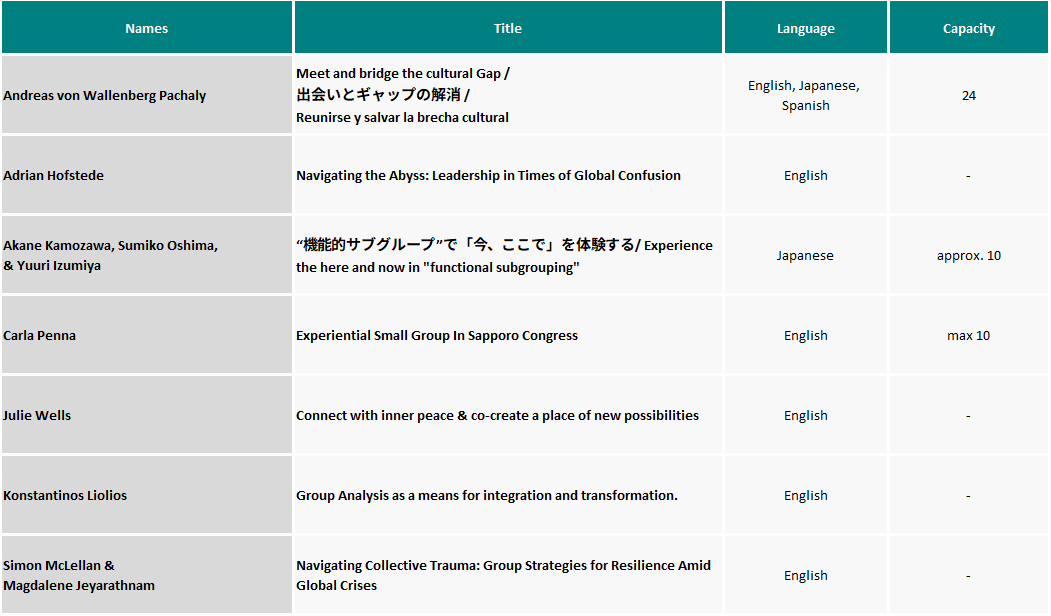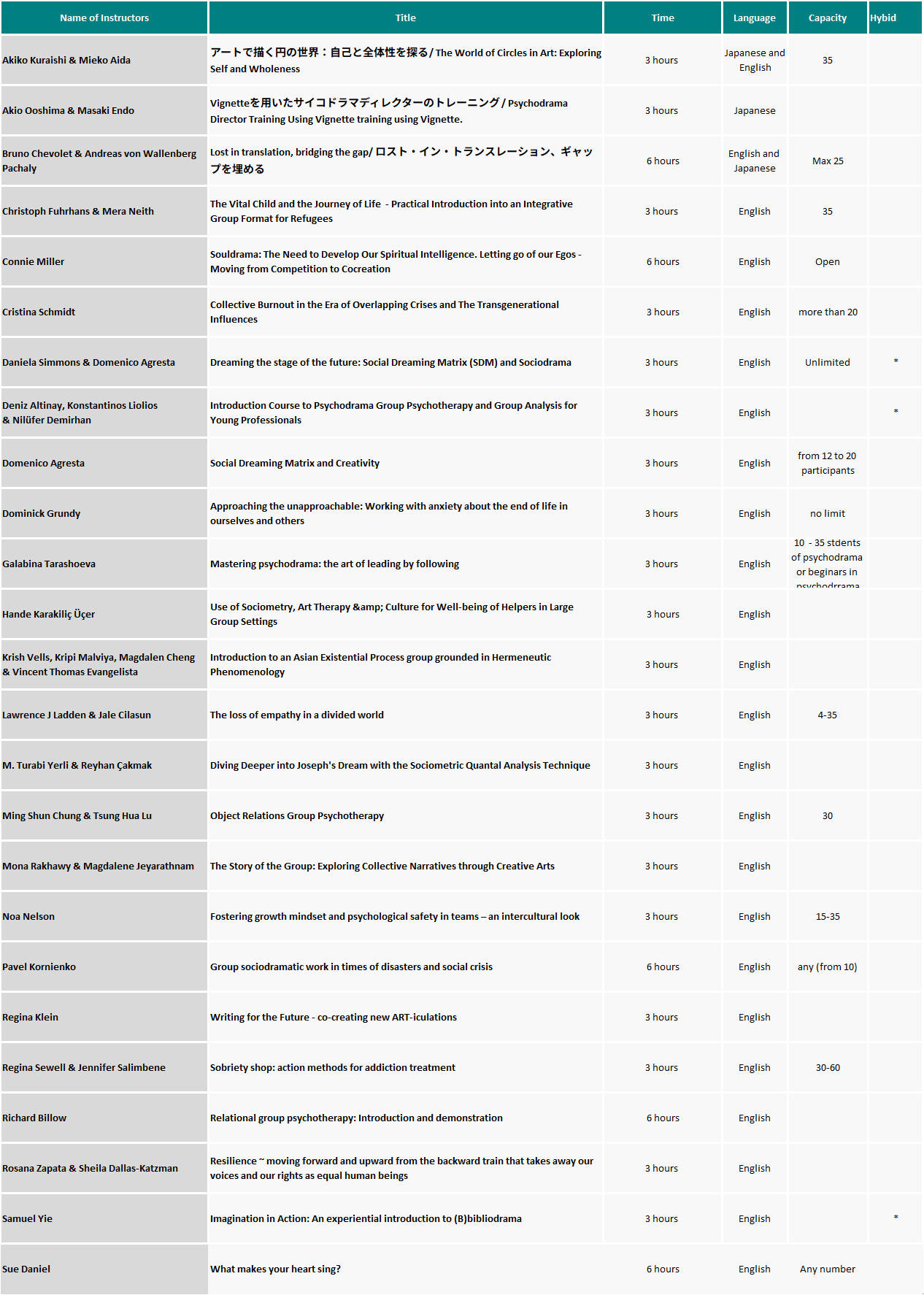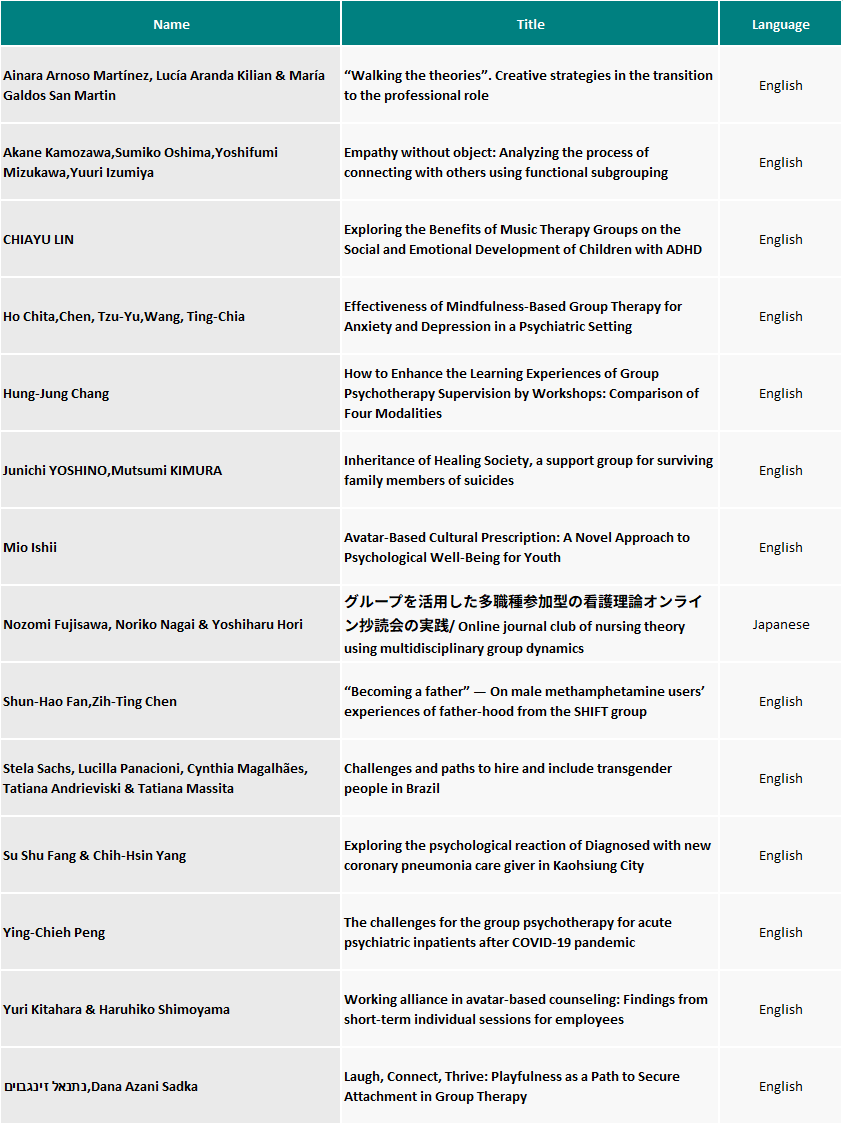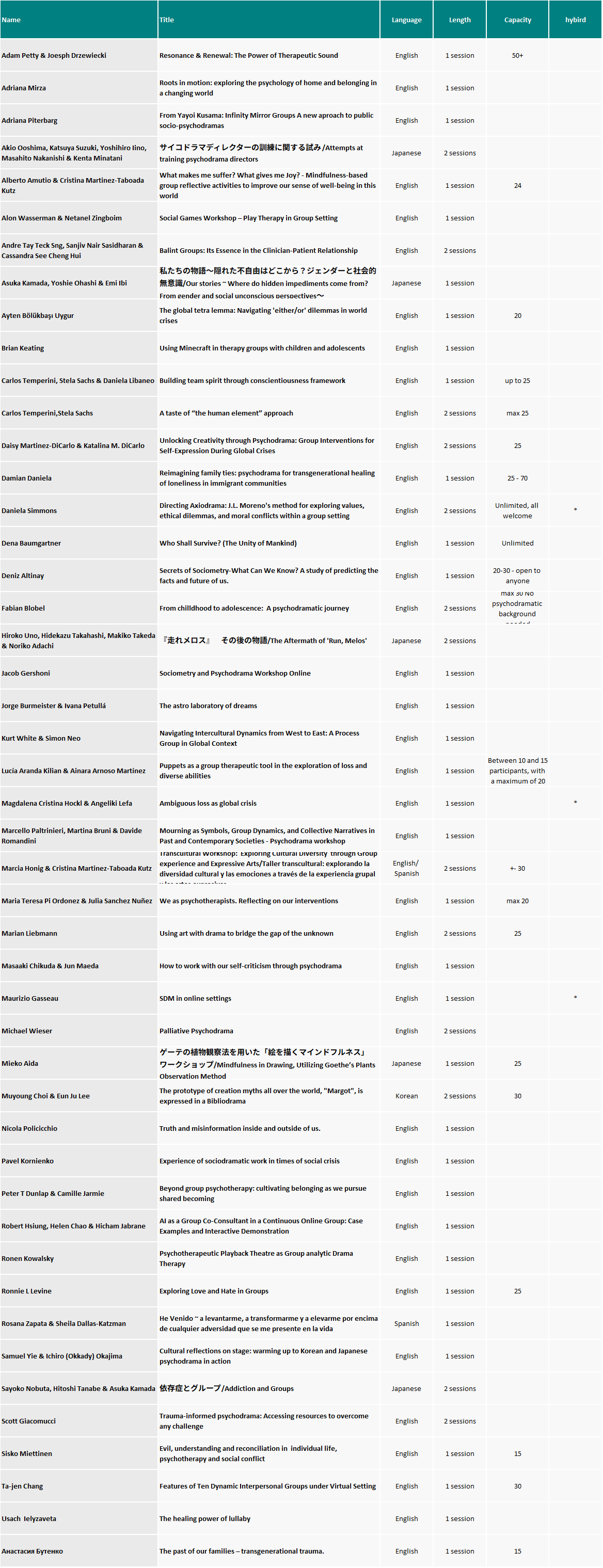Congress Program
The keynote lectures over the three days will be freely open to the public. After each lecture, a discussion between the speaker and the public will be held. Please see this flyer for more details (this flyer is in Japanese).
Keynote Lectures
August 21 (Thursday)
Sheila Dallas-Katzman
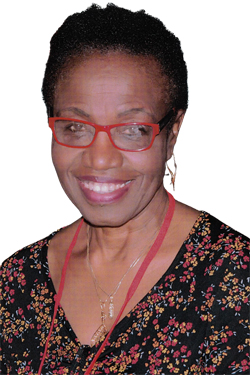
Sheila Dallas-Katzman, M.A., is an accomplished applied theatre practitioner with over 20 years of experience. As co-founder of Ten Lanterns Transformative Theatre, she utilizes theatrical arts and drama-based processes to address critical issues, including social justice, anti-racism, and violence against women. Sheila is the President of the International Association of Women in Radio and Television (IAWRT/USA) and chairs the NYC for CEDAW (Committee on the Elimination of Discrimination against Women) Act Coalition. Sheila serves on the British Psychodrama Association’s (BPA) Diversity and Inclusion Committee and its Ethics Committee, as well as the American Society of Group Psychotherapy and Psychodrama (ASGPP) Sociatry and Social Justice Committee.
Title
Muted Echoes: Confronting the Global Crisis of Violence Against Women and Girls, Including Women Journalists
Abstract
Global crises—climate change, economic inequality, geopolitical conflicts, pandemics, and human rights violations—shape the realities of societies worldwide. At the heart of these crises lies an often-overlooked issue: Violence Against Women and Girls, including targeted violence against women journalists. Women journalists play a critical role in reporting these interconnected challenges, often bringing the human element to global crises. However, they face unique threats at the intersection of their identities as women and journalists. These include professional marginalization, forced isolation into domestic life, and targeted violence aimed at silencing their voices. This keynote will explore the overlooked traumas experienced by women journalists and their broader implications for violence against women and girls worldwide. Through the use of action methods such as sociodrama and psychodrama, we will examine how to raise awareness, foster empathy, and inspire action to address these issues. Shedding light on these experiences not only highlights the plight of women journalists but also enriches the global conversation on gender-based violence and the vital importance of preserving access to information.
Introduced by and Discussed with
Jorge Burmeister
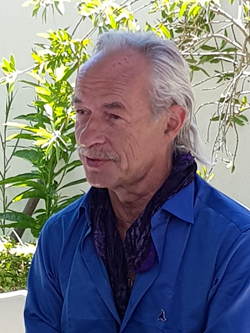
Jorge Burmeister: Trainer, Psychodrama, CBT, Analytic Psychology Jung, Analytic Family therapy, Hypnotherapy; Ex-President, IAGP; Founding member, FEPTO; Founder, Academy for Integrative Psychotherapy/CH; Founder, Center “Jakob and Zerka Moreno” Granada; Dean, “International Summer Academy” Granada; Facilitator, MsF (Doctors without Borders); Recipient of the International Yaacov Naor Award for Peace and Intercultural Dialogue
August 22 (Friday)
Daniel Magnabosco Marra, PhD
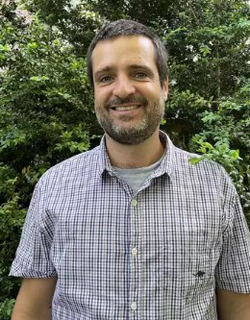
Julius Kühn Institute (JKI) - Federal Research Centre for Cultivated Plants, Institute for Forest Protection (WS), Erwin-Baur-Str. 27, 06484, Quedlinburg, Germany Staff Scientist – Forest Lab (Head) Dr. Magnabosco Marra is a scientist whose research and teaching focus on assessing the effects of natural and anthropogenic disturbances on forest ecosystems. He combines long-term and real-time forest monitoring with climate and remote sensing data, helping to reveal how forests respond to environmental changes, extreme weather, and management practices. He has established hundreds of plots to monitor forest dynamics and diversity in Brazil, Peru, and, more recently, Germany. His research group integrates fundamental and applied science to support strategies and solutions that enhance the resilience of both temperate and tropical forests.
Title
Integrating scales and disciplines to promote climate-resilient forests
Abstract
Trees are long-lived organisms that have shaped landscapes for hundreds of millions of years. Today, forests cover roughly 30% of the global land area and provide critical environmental, social, and economic services. However, frequent and severe disturbances increasingly threaten them. These compound disturbances drive unprecedented tree mortality and structural changes, disrupting biogeochemical cycles, ecological dynamics, and the provision of services. In the tropics, land-use change intensifies these impacts and contributes to drastic losses of habitats and species. A holistic, cross-scale approach is essential to promote climate-resilient forests and inform timely, effective forest policies. In this talk, I will show how multidisciplinary scientific knowledge and inclusive, community-based decision-making can help forests withstand extreme weather events and continue to provide services and support human well-being.
Introduced by and Discussed with
Heloisa Fleury
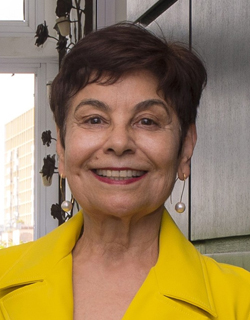
Heloisa Fleury is the IAGP President for the 2022-2025 term and a psychotherapist in private practice in São Paulo, Brazil. Heloisa is a former President of the Brazilian Federation of Psychodrama. She currently serves as the Editor-in-Chief of the Brazilian Journal of Psychodrama, co-editor of the Springer Nature Book Series in Psychodrama, and Treasurer of the Brazilian Association of Scientific Editors. She has authored books, book chapters, and publications in Brazilian and international scientific journals.
August 23 (Saturday)
Kaori Sakagami
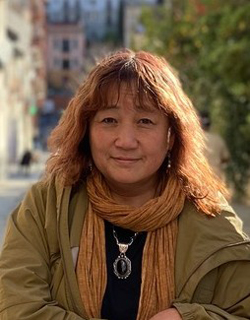
Kaori Sakagami is an independent documentary filmmaker, a non-fiction writer, a workshop practitioner, and a visiting associate professor at Hitotsubashi University. Founded the non-profit organization out of frame, serving as chair. Received numerous awards for her documentaries including Journey of Hope: Two Weeks of Families of Murder Victims with Families of Death Row Inmates (1996), Miller on Monsters (1996), Lifers: Reaching for Life Beyond the Walls (2004), and Prison Circle (2020). Currently running a series of collaborative hip-hop workshops inside juvenile facilities with a rapper, a poet, a dancer, and volunteers and voice message-making workshops at a women’s facility. outofframe http://outofframe.org/en.html prison circle https://prison-circle.com
Title
Witnessing Hope in the Dark through Documentary Filmmaking: Observations of Cross-Cultural Prison Therapeutic Communities
Abstract
As the prominent psychologist George De Leon described “Community as Method”, the purpose of Therapeutic Community (TC) is to promote human growth through communal living and the process of (un)learning rather than punishing and curing addiction/problematic behavior. This is especially in stark contrast to the culture of Japanese prisons, known for their extremely strict military-like discipline and control; therefore, never believed TC would work in a Japanese setting. However, documenting prison TCs both in the US and Japan, holding public screenings, and doing collaborative art workshops inside/outside the walls for a couple of decades has been a way to witness the possibility of unlearning violence, and finding hope in the darkness while struggling with institutional and cultural barriers. This presentation will introduce the philosophy and approach of the Amity model, e.g. hiring formerly incarcerated as staff, emotional literacy, dealing with trauma rooted in childhood, restorative paradigm, aftercare facilities, etc., and share the filmmaker’s observations on the prison TCs in two cultural settings.
Introduced by and Discussed with
Earl Hopper
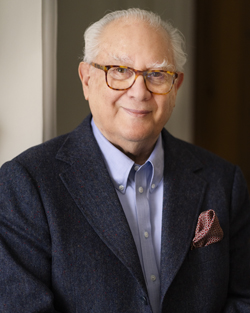
Earl Hopper, PhD, is a psychoanalyst, group analyst and organisational consultant in private practice in London. He is a Fellow of the British Psychoanalytical Society, an Honorary Member of the Institute of Group Analysis, an Honorary Member of the Group Analytic Society International, and a Distinguished Fellow of the American Group Psychotherapy Association. A former President of the International Association for Group Psychotherapy and Group Processes (IAGP). He is the author and editor of many books and articles in psychoanalysis, sociology and group analysis.
Small Group
Experiential Seminar
Poster
Workshop
Symposium
Special Programs
DAY 1 August 20 (Wednesday)
The Screening of an Interview with Daniel Ellsberg: “The Doomsday Machine: Confessions of a Nuclear War Planner” by Bill Roller will start from 18:30 at Conference Hall.
A “Meet the Authors” Event to celebrate the publication of IAGP book: “Cultural Diversity: Groups and Social
Challenges” (Edited by Cristina Martinez Taboada and Marcia Honig) will be held at lunchtime on DAY 1 at SmallHall.
DAY 2 August 21 (Thursday)
“PRISON CIRCLE” Movie Viewing and Talk Session with Kaori Sakagami: The session will be held from 12:45 to 15:15 in the Conference Hall. After watching the film, a discussion with director Sakagami follows.
Social Theatre Event –The Dance of Shadows– will start at 19:00, in the Conference Hall. Direction by Anastasia Diotima Golema.
The Dance of Shadows invites absolutely all the IAGP Congress participants to step beyond intellectual dialogue and into an embodied, improvisational event of collective meaning-making.
DAY3 August 22 (Friday)
Luncheon Seminar Co-sponsored by Otsuka Pharmaceutical Co.,Ltd
Multilayered supports for hikikomori with real and virtual reality world
- Time
- 12:45-13:45
- Venue
- Conference Hall
- Language
- English
- Chair
- Takeshi Inoue, MD,PhD
(Director, Center for Clinical Pharmacology, Sapporo Hanazono Hospital)
- Speaker
- Takahiro A. Kato, MD, PhD
(Professor of Department of Psychiatry, Hokkaido University Graduate School of Medicine)
* Lunch (Japanese Lunchbox) will be provided.
* Please see the flyer.
DAY4 August 23 (Saturday)
Special Workshop: Hikikomori and Groups: Clinical Groups for Hikikomori and Theater Groups by Individuals with Mental Disorders
- Time
- 12:40–13:50
- Venue
- Conference Hall
- Language
- Japanese (Translation support will be provided)
- Opening Remarks
- Takahiro A. Kato, MD, PhD
(Professor of Department of Psychiatry, Hokkaido University Graduate School of Medicine)
- Introduction
- Mitsunobu Sato
(Journalist)
- Facilitator
- Taisei Kubo
(Licensed Psychologist/Clinical Psychologist, Department of Psychiatry, Hokkaido University)
- Presentation and Video
- OUTBACK Project Members
This session will introduce the clinical group activities conducted at the university hospital regarding “Hikikomori”, a social issue not only in Japan but worldwide, along with an overview of the OUTBACK Project (a theater group composed of individuals with mental disorders) which will perform “It’s Okay to Be a Hikikomori” in Sapporo on
August 24. Please see (this flyer is in Japanese).


